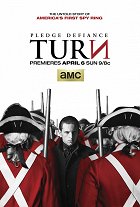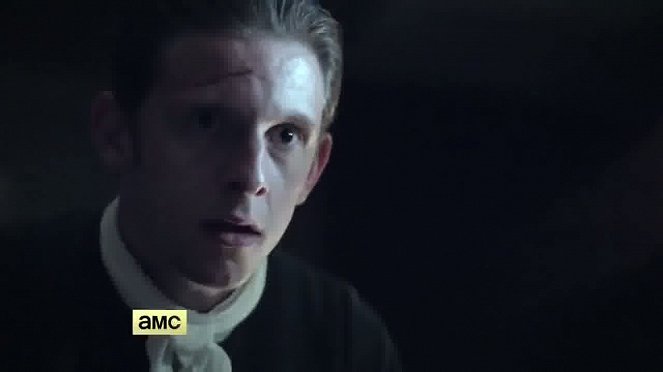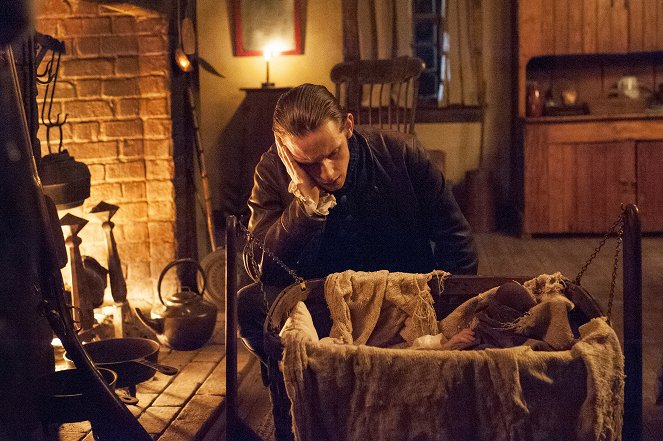Artistes:
Craig SilversteinActeurs·trices:
Jamie Bell, Heather Lind, Seth Numrich, Daniel Henshall, Meegan Warner, Burn Gorman, Angus Macfadyen, Ian Kahn, Samuel Roukin, JJ Feild (plus)Saisons(4) / Épisodes(40)
Résumés(1)
Set in the summer of 1778, show tells the story of New York farmer, Abe Woodhull, who bands together with a group of childhood friends to form The Culper Ring, an unlikely group of spies who turn the tide in America's fight for independence. (texte officiel du distributeur)
Vidéo (3)
Critiques (1)
Season 1 – 45% – Setting works at different periods of American history was already utilized by AMC in the reliable Hell on Wheels. Now we are shifting back a century, when the streets were ruled by the redcoats, the political situation was highly tense, and expressing sympathy towards someone undesirable could be equivalent to a death sentence. Though the reality was exactly the opposite, the groundwork was laid for a gripping period drama. And yet for clever historical-spy adventures you need likable characters, and this is where TURN first, but thoroughly, falls short. The main group is a disgracefully uninteresting collective (Ben and Caleb remain completely anonymous soldiers despite various twists of fate), led by the cowardly and foolishly behaving Abraham. Their opponents, though played by experienced tough guys Burn Gorman and Angus Macfadyen, can't be considered memorable antagonists due to their minimal and inconsistent screen time. The second major problem is the slow pace of the plot. Not that I mind that the creators are taking their time with everything, but when even the smallest problem for the main characters becomes a catastrophic obstacle stretched out to the length of an entire episode, it's not good. Why, then, stick with the series? Because the determined Anna Strong, brilliantly played by the enchanting Heather Lind, deserves full attention, and it's because of her fate that I will eventually return to Mr. Culpeper and his campaign against Simcoe and his kind. Season 2 – 55% – It's surprising how many uninteresting characters appear beside the positive figures. In the camp of the main heroes, everything remains the same, and Abraham, despite his prison odyssey, gains more negative, unappealing points, precisely because he presents his several-month stay in jail as twenty years in the galleys. In addition, George Washington himself, played by the awkward Ian Kahn, increasingly takes the lead in the movement, looking sadly half-hearted, and the special episode with him at the center of the action is unfortunately one of the worst episodes I have ever seen. If it weren't for the conflicted Anna, I would probably cheer for the enemy without hesitation. There, both the ambiguous Hewlett and the increasingly likable John Andre attract attention. Despite this, I don't know what to do with the series now. The first half of the season showed remarkable improvement, but the inconsistent behavior of the regular characters (Woodhull Sr. behaves kindly and understandingly for a while, only to swear constantly in the next episode) and the stumbling central storyline significantly hinder this effort over time. Season 3 – 80% – The fates of the characters have finally reached where they should have been from the very beginning – the realm of nerve-racking situations, crucial decisions, and moments when the lives of those involved hang by a thread. But what fascinates me the most is how much I am engaged in the doomed romantic storylines. Major Hewlett's feelings towards Anna, followed by Major André's enduring love for Peggy, always break my heart on demand, and I willingly forgive some unnecessary digressions or casting mistakes (the likable Owain Yeoman is uncomfortably stiff as Benedict Arnold). Combined with the diminished focus on Abraham and Mary, and finally including the originally planned inner circle around Washington, I shockingly realize that this wearisome history lesson has turned into a thrilling spy saga, and the last two episodes of the third season can undoubtedly be ranked among the best of the entire television series. Season 4 – 70% – In the end, it truly was a story about great people, from which the screenwriters unfortunately tried to make an even bigger story. In the end, questions remain as to whether it was really necessary to extend the war for four full seasons, when most of the supporting characters (Peggy) did not live up to the expectations promised by the extent of their screen time. In the final moments, I somewhat reconcile with Abraham, who often selfishly resisted various obstacles or the natural course of events to the point where I questioned if viewers could even manage to root for him. However, his fate ultimately takes him to the very center of all the battles, and I can accept that as his redemption, especially after the actual finale. This conceals a beautiful epilogue, which proves that the story of Washington's spies was not just about warfare and intrigue, but above all about love that lasts beyond the grave. For some, it may seem like a weak ending, but for me, it confirms that the series found its identity and stuck with it.
()
(moins)
(plus)


